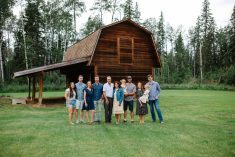It’s a movie standard. When the mob turns angry, they start wielding pitchforks. Whether it’s a monster that incites them or an invading army, when the local population goes berserk, and when they suddenly get transformed into nightmarish creatures of violence, the first thing they reach for is the nearest farm implement.
It’s a scene that resonates on thousands of farmsteads along all the country roads that crisscross Canada, where working closely together with family under stressful conditions can teach all sorts of lessons about rage.
No one pushes your buttons like a spouse, sibling or child. And heaven help those who get caught up in double-trouble, where an angry boss is also a parent.
Read Also

Lessons from the past: How Canada can reverse its shrinking share of the global food market
A historic look back at how Canada has positively dealt with trade issues — and how those lessons can inform future moves.
Or maybe worst of all — what if the disgruntled employee, or simply the guy who can’t seem to play along with the team, is also your elder. Do you dare fire Dad?
Even if you can financially afford to, experts resoundingly urge caution. “Solve the problem,” they say. “Don’t pour fuel on it.”
Whether you’re the new king on the block, or whether you’re an heir stuck in a seemingly endless cycle of waiting, leave the pitchfork alone, they say. Instead, use these tools to help your parents invent new roles for themselves on the farm.
1. Use the future in your favour
It is always easier to talk about unpleasant situations before they become reality, which explains why Dr. John Fast, founder of Family Enterprise Solutions in Waterloo, Ont., suggests families talk about re-inventing roles long before change is necessary.
Have discussions about the physical and mental skills that are required to perform certain jobs well, and talk about what should happen if any family member loses these abilities. Most important, start having these kinds of conversations when everyone is in good health, generally in their 50s, says Fast.
In fact, adds Art Lange, farm adviser at Sherwood Park, Alta., Mom and Dad should start exploring new, less physically demanding interests before their roles on the farm start to change, and they should also start cultivating more off-farm connections and goals.
“Then, when they can no longer be so active in it, the farm won’t still be their whole reason for living,” Lange says.
But since many farmers never really retire, Elaine Froese, a farm family coach and succession planner at Boissevain, Man., says it’s also important to clarify how Dad’s role will shift, and what his new purpose needs to be. “Dad is not going to let go of power and control until he has something better or more exciting to move forward to,” Froese says, “So I think it’s up to the next generation to be really creative in making something fantastic for Dad to move forward to.”
Perhaps this means your farm can finally expand on its marketing strategy with your father able to dedicate his focus and expertise to it in a way that there was never enough time for earlier in his career. Or maybe a tangled woodlot gets some long needed attention, or maybe some windbreaks get planted around the farm, helping your father rediscover his earlier interest in trees.
In fact, Froese says this is a moment in the farm’s life when there can be great opportunities to seek win-win scenarios, where everyone feels fulfilled and gets to contribute value to the farm.
2. Keep asking for advice
One strategy that Art Lange highly recommends is to slow the farm’s decision-making processes down to create more time for discussing issues and to keep everyone included. He suggests making it a regular practice to have two meetings before moving forward with major decisions. Use the first meeting to explore the idea and select a point person to conduct a thorough investigation of options available, and then have a followup meeting where the family makes the final decision together.
“Even after the control of the farm has been transferred, ask Mom and Dad for input,” adds Lange. This ensures the older generation knows that their opinion is welcomed, even if it isn’t necessarily followed. Be particularly mindful in the case of decisions which can come down to personal preference, such as the purchase of a tractor, warns Elaine Froese. “A lot of fathers just want respect for their opinion,” she says. “They don’t need to have the final say. They just need to be consulted.”
3. Open the treasury
Fast urges farmers not to wait until their kids are in their 40s or 50s to help them get established as sound financial managers. The farms and farm families that do well, he says, are the ones where the parents help the next generation build up some equity as quickly as possible. “Help them put a down payment down on a 100-acre farm in their 20s so that they can go to the bank in their 30s or 40s and cut a deal to give the parents some cash,” Fast recommends. “It means less risk for the parents and fewer control issues later on.”
Lange also sees how money and control work hand in hand. One of the first questions he always asks new clients is if the first generation is sharing signing authority for the farm. If not, he gently suggests the second generation be given some control of the chequebook as a positive step towards a full transfer of the reins.
The rights and responsibilities that come with acquiring farm equity do need to be outlined by a good shareholder’s agreement, of course, but this too offers everyone some security in moving through conflicts.
Froese adds that it’s normal for the older generation to be more risk averse when it comes to debt management, so some measure of conflict may be inevitable. But, she says, consider it a red flag when all your fights are starting to be about money.
4. Professionalize the farm
Few family businesses do performance evaluations well. Instead, says Fast, it should be common business practice to have regular, at least annual, checkups for key employees and family members to help everyone achieve their full potential in their chosen area of work.
“If they were working any other job, they would get performance reviews, they would be put on a development program, and they would grow in their managerial capacity,” Fast says. “Why aren’t you treating them like other good employers would treat their best employees?”
Froese suggests taking a non-threatening, formal approach to these discussions, starting with an attitude of listening, and not being judgmental. “‘Dad, what would you like me to do differently?’ is a really good question,” she says.
Froese also recalls an article she posted to her website in the fall of 2013 called “What to do when things don’t work out,” and how it inspired a troublingly high volume of feedback.
Some of her “signs that it’s time to go” which hit home with so many young farmers include losing sleep for more than a year, stomach pains or headaches, a rockier relationship with a spouse or children, uncontrollable emotional outbursts, repetitive conversations with friends about work, a drain on financial resources, suffering from abuse, or ineffective outside interventions.
That said, Froese has also seen clients suddenly realize that Dad’s unwillingness to change didn’t have anything to do with what had or hadn’t been done, it was just that their perceptions of reality would never align. This realization then freed them to just let the conflict go and get on with the business of farming.
“What I want farmers and fathers to discover is that things can go pretty bad, pretty fast, but it’s the persistence of it never getting better over months and years where people lose hope,” says Froese. “If you want to have healing and restoration of a situation that’s really gone in the wrong direction, look at your model of forgiveness.”
— Amy Petherick is a farm communications consultant and farmer based at Campbellford, Ont. This article appears in the January 2014 edition of Country Guide (pages 52-53).
















